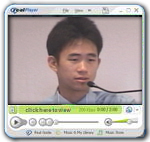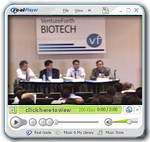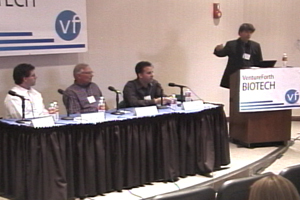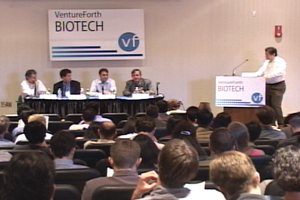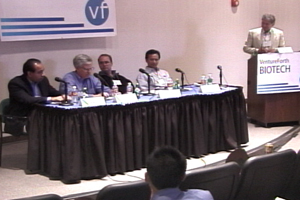Entrepreurial Engineering Students Stage Sell-Out Biotechnology Conference
|
San Diego, CA, May 23, 2005 -- When VentureForth hosted its second annual Biotechnology Entrepreneurship Conference on Saturday, May 21, faculty, venture capitalists, and biotech industry executives showed up in force. But the day belonged to the students. "VentureForth is a UCSD student organization and all of the organizers were students," said conference chair Kevin Jung, a fourth-year computer engineering major. "UCSD is traditionally a more research-oriented university, so our agenda was designed to show students what kinds of options they can have in the future beyond pure academic research."
Roughly 250 people packed Hojel Auditorium in the Institute of the Americas, and the standing-room-only crowd spilled over to a nearby conference room where 30 or more attendees watched via closed-circuit TV. The day-long proceedings were also webcast live over the Internet by the California Institute for Telecommunications and Information Technology (Calit2), a co-sponsor of the event. [Streaming videos of all the talks and panel discussions can now be viewed on-demand from the links below; Real player required.]
|
For VentureForth's budding entrepreneurs, the conference was a unique chance to rub elbows with some of the biggest names in biotech. The founding father of San Diego's biotech cluster, Ivor Royston, delivered one of two keynote speeches. "San Diego has a research infrastructure without parallel," said Royston, who started it all 27 years ago when he founded Hybritech. He noted the presence of UCSD and a number of non-profit research centers including the Burnham Institute, Sidney Kimmel Cancer Center, Salk Institute, and The Scripps Research Institute - the largest independent biological research institute in the world. "These are the engines of invention that drive the life science industry in San Diego, and altogether we receive $937 million a year in NIH grants, more than the Bay Area," said Royston. "It's like having a little National Institutes of Health of the West."
Royston noted that other cities have tried to emulate San Diego's success in biotech, but most have failed. "The research alone is not sufficient, because there are plenty of places with superb science," said Royston, who was on the UCSD School of Medicine faculty from 1978 to 1990, before founding the venture-capital firm Forward Ventures. "You also need three other characteristics that have developed in San Diego: scientific entrepreneurship; skilled management talent; and early-stage venture capital."
|
Charles Cantor, chief scientist at SEQUENOM, Inc., was asked to trace his path from academia to business, and emphasized the importance of networking. "You collectively have a fantastic advantage over most other groups because you will have lots and lots of classmates who will be very successful in biotech," Cantor told students in the audience. "So even if any one individual is not very successful, you'll have a great network and that network will help you prosper in your career." The scientist also warned students to understand that while academics value individuality, most companies put more emphasis on teamwork.
Three panels included experts who have worked on various stages of bringing biotech and biomedical inventions from the laboratory bench to the marketplace. The morning panel, "From Academia to Industry," was moderated by Paul Kedrosky, academic director of the Jacobs School of Engineering's von Liebig Center for Entrepreneurism and Technology Advancement.
A second panel on trends in biotechnology was moderated by Royston and included CEOs or senior executives from four area companies: Egea Biosciences; GenWay Biotech; Synthasome; and Genomatica
|
(represented by its president, UCSD alumnus Christophe Schilling, who co-founded the company with UCSD bioengineering professor Bernhard Palsson).
The final panel discussion focused on legal issues facing the biotech industry and the transfer of technology from non-profit research labs. Duane Roth, executive director of Connect (formerly UCSD Connect), moderated the panel that included attorneys from three San Diego law firms, as well as UCSD assistant vice chancellor Alan Paau, director of UCSD TechTIPS.
"San Diego is one of the biggest superpowers in biotech," said organizer Kevin Jung. "So it was great for students to be able to hear directly from the people who are responsible for building companies and transferring technology."
If it seems unlikely that a computer-engineering major would be organizing a biotechnology conference, Jung says it is not that surprising: "Computing and medicine are two rapidly merging fields, and they will become even more so in the future." Jung will apply to medical school next year, but adds, "ultimately I would like to start my own company."
Jung isn't the only engineering student bitten by the entrepreneurship bug. Many of VentureForth's officers are enrolled in the Jacobs School of Engineering. Conference organizers included vice-chair Nitin Gupta, a bioinformatics grad student; third-year bioengineering undergrad John Zacaria; and Ian Lian, a bioengineering Ph.D. candidate. Another vice-chair, Jason Lanier, is in the biomedical sciences Ph.D.
|
program, and VentureForth co-president Kerry Tan is a junior majoring in economics.
Also volunteering to help out at the May 21 event were members of the campus branch of the Biomedical Engineering Society (BMES). Reetu Singh, Jin Huang, Julianna Yeung,
and Janet Hsu are all bioengineering majors.
Sponsors of the Biotechnology Entrepreneurship Conference included biotech firms Invitrogen, Ligand Pharmaceuticals and Applied Biosystems; the law firms Latham & Watkins, Fish & Richardson, and David R. Preston & Associates; UCSD TechTIPS and Connect; and three centers affiliated with UCSD's Jacobs School: the von Liebig Center; Whitaker Institute of Biomedical Engineering; and the UCSD Division of Calit2.
Related Links
Media Contacts
Media Contact: Doug Ramsey, (858) 822-5825, dramsey@ucsd.edu

